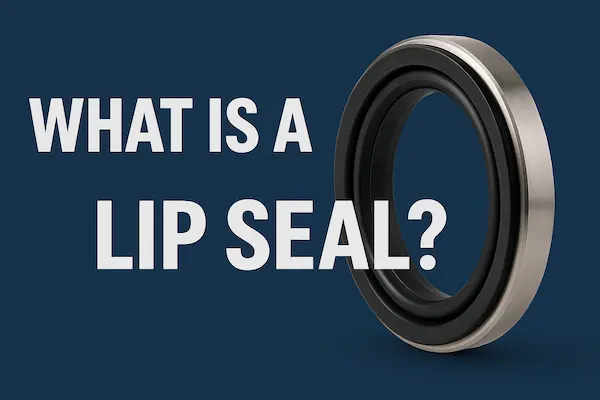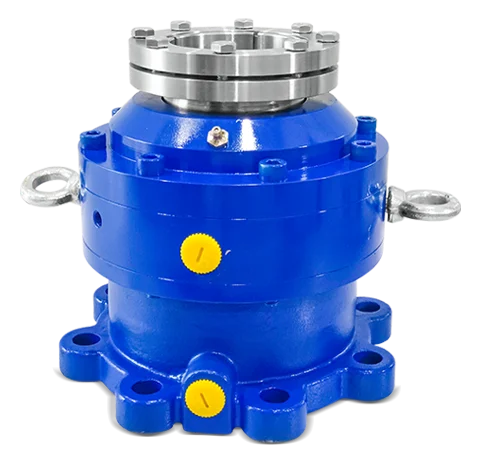Posted At: Jun 02, 2025 - 2,963 Views

What Is a Lip Seal? Everything You Need to Know
Lip seals, also known as radial shaft seals, are essential components in countless machines and mechanical systems. Whether you're working with engines, pumps, gearboxes, or industrial machinery, a lip seal plays a critical role in keeping things running smoothly. But what exactly is a lip seal, and why is it so important?
In this blog, we’ll break down what a lip seal is, explore different lip seal types, and explain how they work, where they’re used, and why choosing the right one is essential for long-term performance and reliability.
What Is a Lip Seal?
A lip seal is a device used to seal rotating shafts and prevent fluid leakage while keeping contaminants like dust and dirt out of the system. It typically features a flexible sealing lip that presses against the shaft, maintaining contact and forming a tight seal.
A lip seal — often referred to as an oil seal — plays a critical role in machinery by preventing fluid leakage and blocking contaminants. While the terms are sometimes used interchangeably, it's important to understand the specific differences and applications of each. For a more detailed breakdown of oil seals, including their types, uses, and materials, check out our in-depth guide on Oil Seals: Everything You Need to Know.
Why Are Lip Seals Important?
Lip seals serve a dual purpose:
- Retain lubrication: They prevent oil or grease from escaping the housing.
- Exclude contaminants: They stop dust, dirt, water, or other harmful particles from entering the system.
Without a reliable lip seal, internal components could wear prematurely due to contamination or lack of lubrication, leading to costly repairs or system failure.
How Does a Lip Seal Work?
Lip seals work by maintaining continuous contact with the rotating shaft. The sealing lip — usually made from flexible elastomers like nitrile rubber (NBR), silicone, or Viton — forms a barrier that adapts to the shaft's motion. A spring (called a garter spring) is often used to ensure consistent pressure and maintain the seal under dynamic conditions.
The lip is typically angled and designed to push against the fluid on one side, creating a sealing effect while allowing smooth rotation of the shaft.
Common Lip Seal Materials
Choosing the right material is vital for ensuring long-term performance. Here are some common lip seal materials:
- Nitrile Rubber (NBR) – Great for oils and fuels; commonly used in general industrial applications.
- Fluoroelastomer (Viton) – Offers excellent chemical and high-temperature resistance.
- Silicone – Flexible across wide temperature ranges but not ideal for abrasive environments.
- PTFE (Teflon) – Suitable for harsh chemicals and dry running applications.
Types of Lip Seals
Understanding the lip seal types helps in selecting the right one for your application. Here are some of the most commonly used:
1. Single Lip Seal
This basic type has one sealing lip and is designed primarily to retain fluid. Ideal for less demanding applications.
2. Double Lip Seal
This type includes a secondary lip that helps exclude dust and dirt, making it suitable for more contaminated environments.
3. Spring-Loaded Lip Seal
Incorporates a spring around the sealing lip for added pressure, which helps maintain the seal even under shaft misalignment or wear.
4. PTFE Lip Seal
Made from Teflon, this type is used in extreme temperatures and chemical environments. It offers low friction and high durability.
5. Metal-Cased Lip Seal
A lip seal housed in a metal casing for added structural support and strength — commonly used in high-pressure applications.
Where Are Lip Seals Used?
Lip seals are used in a wide range of industries, including:
- Automotive: In engines, transmissions, and wheel hubs
- Industrial Machinery: To seal rotating shafts and bearings
- Pumps and Compressors: To retain lubrication and prevent leaks
- Agricultural Equipment: To protect against dust and debris
- Marine Applications: To prevent water ingress in drives and shafts
Signs of a Failing Lip Seal
Lip seals don’t last forever. Here are common signs that a lip seal may need replacement:
- Visible oil leaks
- Increased noise or vibration near the shaft
- Contamination in lubricants
- Shaft wear or scoring
- Overheating in the sealed area
Regular inspection and maintenance can help detect these issues early and avoid system breakdowns.
How to Choose the Right Lip Seal
When selecting a lip seal, consider the following factors:
- Operating Temperature
- Rotational Speed
- Chemical Compatibility
- Pressure Conditions
- Environmental Exposure (dust, water, etc.)
- Shaft Surface Finish
Choosing the wrong seal can lead to premature failure, so it's important to evaluate your system’s requirements carefully.
Tips for Lip Seal Installation
- Clean the shaft thoroughly before installation
- Lubricate the sealing lip to reduce friction during startup
- Use proper tools to avoid damage during fitting
- Ensure the seal is aligned and seated evenly
- Avoid reusing old seals or springs
Correct installation helps extend the life of your lip seal and improves system efficiency.
Conclusion
Lip seals are small components with a big impact. From preventing leaks to protecting sensitive internal components, their role in mechanical systems is essential. Understanding what a lip seal is, recognizing lip seal types, and choosing the right material and design can significantly enhance the reliability of your machines.
Whether you're dealing with industrial pumps, automotive engines, or marine equipment, selecting the correct lip seal ensures better performance, reduced maintenance, and longer equipment life.
Frequently Asked Questions
1. Are lip seals and oil seals the same?
Lip seals and oil seals are often used interchangeably, but technically, oil seals are a type of lip seal specifically designed to retain lubricants and block contaminants.
2. How long do lip seals last?
The lifespan of a lip seal depends on several factors including material, operating conditions, and maintenance. On average, a well-installed seal can last several thousand hours of operation.
3. Can a damaged lip seal be repaired?
No, damaged lip seals should always be replaced. Repairing a seal is not recommended as it compromises performance and could cause further damage to your system.
4. What causes lip seal failure?
Common causes include shaft misalignment, excessive heat, improper installation, or abrasive contaminants. Using the correct material and following best practices during installation can reduce failure risks.
5. Can lip seals be used in high-pressure systems?
Standard lip seals are not ideal for high-pressure applications. However, reinforced or double-lip seals can sometimes be used in moderate-pressure environments. Always check manufacturer specifications for pressure ratings.


